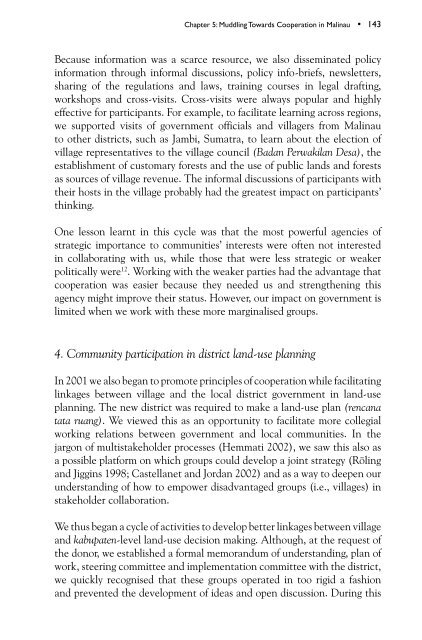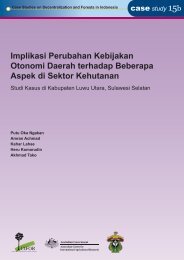Adaptive collaborative management of community forests in Asia ...
Adaptive collaborative management of community forests in Asia ...
Adaptive collaborative management of community forests in Asia ...
Create successful ePaper yourself
Turn your PDF publications into a flip-book with our unique Google optimized e-Paper software.
Chapter 5: Muddl<strong>in</strong>g Towards Cooperation <strong>in</strong> Mal<strong>in</strong>au • 143<br />
Because <strong>in</strong>formation was a scarce resource, we also dissem<strong>in</strong>ated policy<br />
<strong>in</strong>formation through <strong>in</strong>formal discussions, policy <strong>in</strong>fo-briefs, newsletters,<br />
shar<strong>in</strong>g <strong>of</strong> the regulations and laws, tra<strong>in</strong><strong>in</strong>g courses <strong>in</strong> legal draft<strong>in</strong>g,<br />
workshops and cross-visits. Cross-visits were always popular and highly<br />
effective for participants. For example, to facilitate learn<strong>in</strong>g across regions,<br />
we supported visits <strong>of</strong> government <strong>of</strong>ficials and villagers from Mal<strong>in</strong>au<br />
to other districts, such as Jambi, Sumatra, to learn about the election <strong>of</strong><br />
village representatives to the village council (Badan Perwakilan Desa), the<br />
establishment <strong>of</strong> customary <strong>forests</strong> and the use <strong>of</strong> public lands and <strong>forests</strong><br />
as sources <strong>of</strong> village revenue. The <strong>in</strong>formal discussions <strong>of</strong> participants with<br />
their hosts <strong>in</strong> the village probably had the greatest impact on participants’<br />
th<strong>in</strong>k<strong>in</strong>g.<br />
One lesson learnt <strong>in</strong> this cycle was that the most powerful agencies <strong>of</strong><br />
strategic importance to communities’ <strong>in</strong>terests were <strong>of</strong>ten not <strong>in</strong>terested<br />
<strong>in</strong> collaborat<strong>in</strong>g with us, while those that were less strategic or weaker<br />
politically were 12 . Work<strong>in</strong>g with the weaker parties had the advantage that<br />
cooperation was easier because they needed us and strengthen<strong>in</strong>g this<br />
agency might improve their status. However, our impact on government is<br />
limited when we work with these more marg<strong>in</strong>alised groups.<br />
4. Community participation <strong>in</strong> district land-use plann<strong>in</strong>g<br />
In 2001 we also began to promote pr<strong>in</strong>ciples <strong>of</strong> cooperation while facilitat<strong>in</strong>g<br />
l<strong>in</strong>kages between village and the local district government <strong>in</strong> land-use<br />
plann<strong>in</strong>g. The new district was required to make a land-use plan (rencana<br />
tata ruang). We viewed this as an opportunity to facilitate more collegial<br />
work<strong>in</strong>g relations between government and local communities. In the<br />
jargon <strong>of</strong> multistakeholder processes (Hemmati 2002), we saw this also as<br />
a possible platform on which groups could develop a jo<strong>in</strong>t strategy (Röl<strong>in</strong>g<br />
and Jigg<strong>in</strong>s 1998; Castellanet and Jordan 2002) and as a way to deepen our<br />
understand<strong>in</strong>g <strong>of</strong> how to empower disadvantaged groups (i.e., villages) <strong>in</strong><br />
stakeholder collaboration.<br />
We thus began a cycle <strong>of</strong> activities to develop better l<strong>in</strong>kages between village<br />
and kabupaten-level land-use decision mak<strong>in</strong>g. Although, at the request <strong>of</strong><br />
the donor, we established a formal memorandum <strong>of</strong> understand<strong>in</strong>g, plan <strong>of</strong><br />
work, steer<strong>in</strong>g committee and implementation committee with the district,<br />
we quickly recognised that these groups operated <strong>in</strong> too rigid a fashion<br />
and prevented the development <strong>of</strong> ideas and open discussion. Dur<strong>in</strong>g this
















